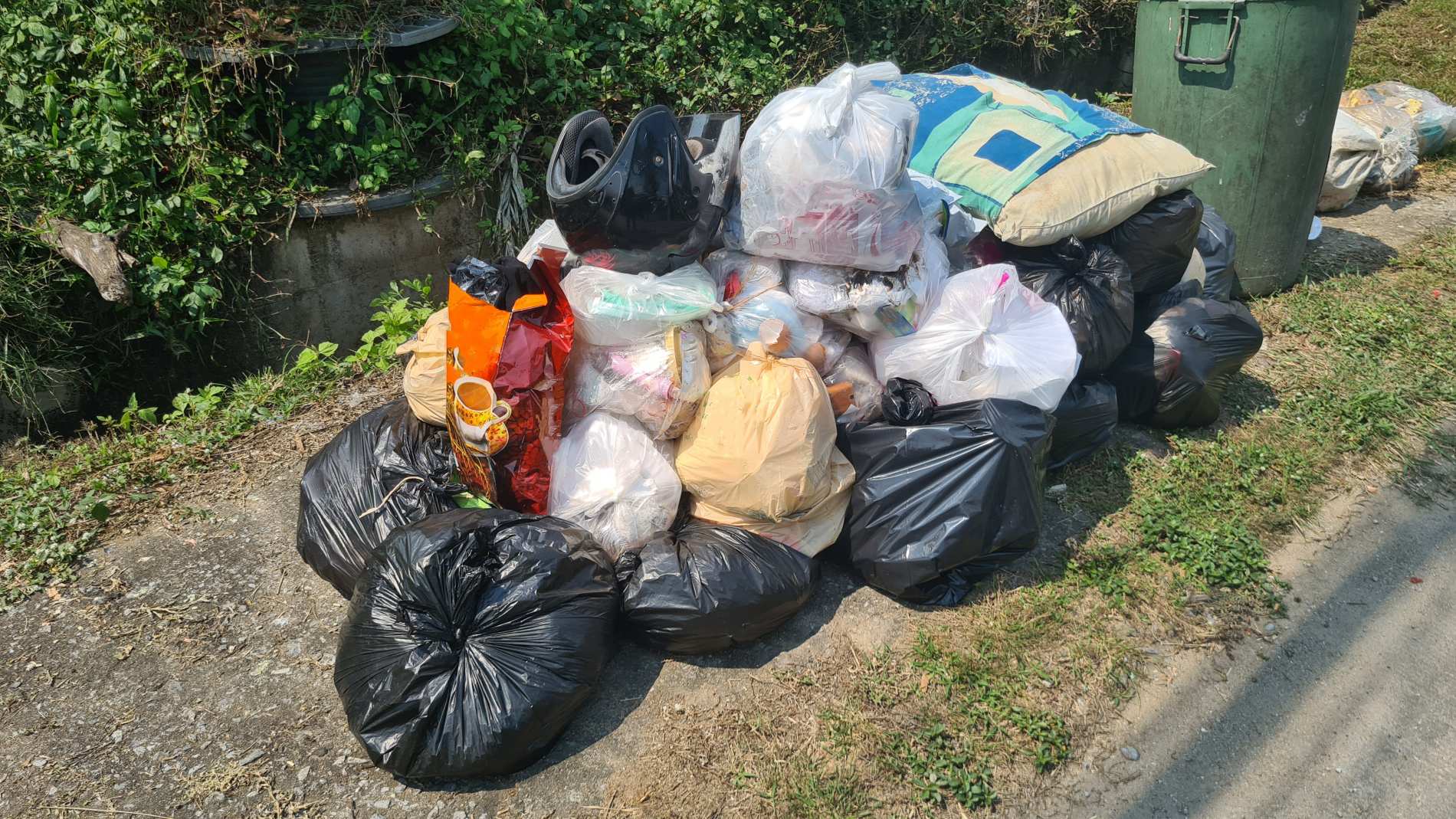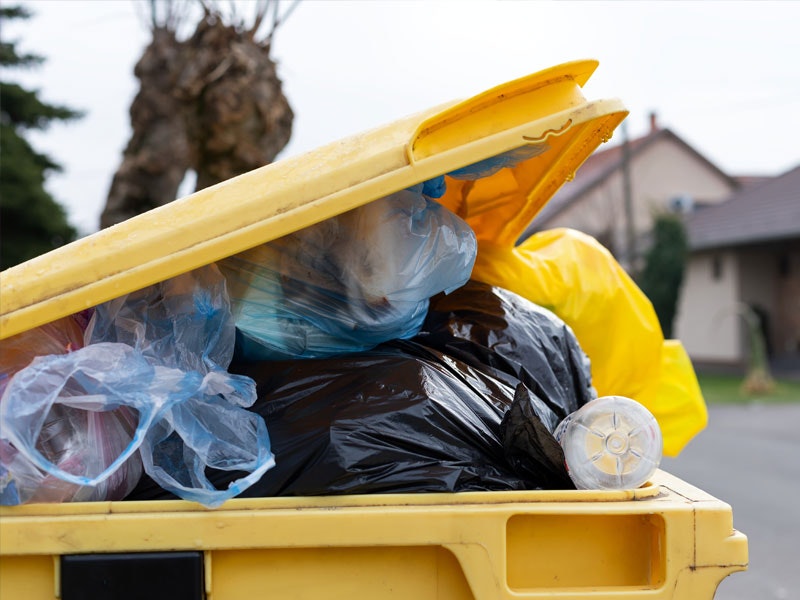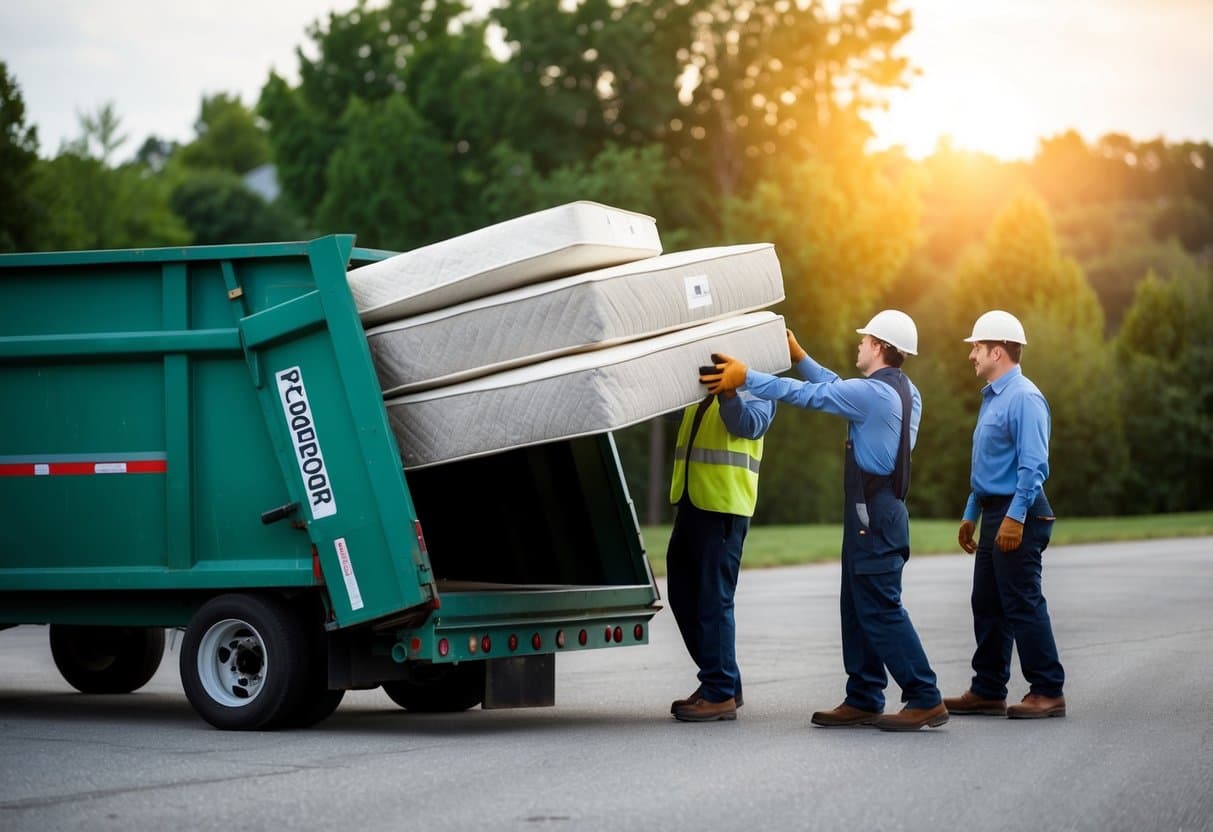Not everything can go in a dumpster—and knowing what’s allowed can save you from surprise fees or fines. Whether you’re clearing the garage, remodeling, or working on your yard, sorting your waste matters.
Dumpster rental companies have rules about what can and can’t go in their bins, often based on local laws and landfill policies.
This guide breaks it down in simple terms—you’ll learn what’s safe to toss, what to avoid, and where to take items that aren’t allowed.
By the end, you’ll feel more confident using your dumpster—and less anxious about getting it wrong.
What can you put in a dumpster rental?
You can usually toss household junk, yard waste, construction debris, and non-hazardous materials in a dumpster, depending on local rules and your provider’s guidelines.
Key Takeaways:
- You can throw away household junk, yard waste, construction debris, and non-hazardous items in most dumpsters.
- Hazardous materials, electronics with Freon, medical waste, and tires are typically banned.
- Local rules and landfill guidelines may affect what you can toss.
- When unsure, ask your dumpster rental provider to avoid extra fees or fines.
- Safe alternatives exist for restricted items, like donation, recycling, or special drop-off events.
Common Items You Can Put in a Dumpster
Most dumpster rental companies allow a wide range of everyday waste. Whether you’re clearing out your house or handling a renovation, here are the common items you can usually throw in.
1. Household Junk

Old furniture, boxes of clutter, and general junk from the attic or garage are all fair game. Sofas, chairs, clothes, toys, books, and non-electronic appliances are typical items tossed during a cleanout.
2. Yard Waste
Leaves, branches, grass clippings, and small tree stumps are usually allowed in dumpsters, especially if you’re doing yard work or landscaping. Just be sure to keep the materials clean and not mixed with other trash. Some areas may require separate bins for yard debris, so check with your provider first.
3. Construction and Renovation Debris
If you’re remodeling, you can usually toss drywall, wood, tiles, flooring, and cabinetry. Fixtures like sinks, toilets, and old countertops are also commonly accepted. These bins are great for bathroom and kitchen upgrades or small demolition projects.
4. Non-Hazardous Debris
You can also throw out cardboard, paper, plastic containers, and most non-toxic materials. If it’s something you’d usually put in your regular trash (but too bulky for a garbage can), chances are it can go in the dumpster.
Keep in mind that while most of these items are accepted, weight limits do apply. If you’re getting rid of heavy materials like concrete or roofing shingles, ask your rental company about proper sizing or special dumpsters.
Sorting your load upfront saves you time, money, and hassle later. When in doubt, snap a photo or make a quick call to your provider before tossing questionable items in.
What You Can’t Put in a Roll-off Dumpster
Not everything is safe—or legal—to toss in a dumpster. Some items require special handling or disposal due to environmental or safety risks. Here’s what to keep out and why.
1. Hazardous Materials

Paints, solvents, gasoline, pesticides, and cleaning chemicals are considered hazardous waste. These can’t go in a dumpster because they’re flammable, toxic, or corrosive. If you’re wondering, can you throw away paint in a dumpster in Honolulu, the answer is no—just like in most places, these materials must be handled through proper disposal channels. Most cities, including Honolulu, have drop-off sites or special collection days for these items.
2. Electronics and Appliances with Freon
Televisions, computer monitors, refrigerators, air conditioners, and dehumidifiers often contain materials like lead or refrigerants. These require separate recycling or disposal. Contact your local recycling center or ask the rental provider for e-waste disposal options.
1. Tires and Batteries
Tires are banned from most landfills because they trap gases and don’t decompose well. Car batteries and other types also contain hazardous chemicals. Instead, take them to a tire shop, auto parts store, or designated recycling site. It’s important to note that tires in dumpster laws Temecula CA prohibit disposing of them in regular dumpsters, making proper recycling essential.
2. Medical Waste and Sharp Objects
Needles, expired medications, and other medical waste should never be tossed in a dumpster. They pose a health risk to waste handlers. Pharmacies or health departments often have safe disposal programs.
3. Asbestos and Contaminated Soil
These materials are heavily regulated and must be handled by licensed professionals. Never try to dispose of them in a regular dumpster—doing so could lead to hefty fines.
When you’re unsure about an item, play it safe. Reach out to your rental company or local waste management office for guidance. It’ll help you stay in compliance and avoid problems later.
Special Cases — Items You Might Be Able to Dump Mattress
Some items fall into a gray area. You might be able to toss them in a dumpster, but it depends on your location and the rental provider’s rules. Here’s what to watch for.
1. Mattresses and Box Springs

Many areas allow mattresses and box springs, but some landfills charge extra fees to accept them. In other places, they may be completely banned. If allowed, you may need to wrap them in plastic before disposal.
2. Treated Wood and Shingles
Pressure-treated wood, like deck boards or fencing, may be accepted in some dumpsters but not others. Roofing shingles are also tricky—they’re heavy and can hit weight limits fast. Ask your provider about weight restrictions or whether a separate container is needed.
3. Old Carpeting and Padding
You can usually toss carpet and padding, but it’s smart to check if they need to be cut into smaller sections. Some landfills have guidelines on how much you can dispose of at once.
4. Small Appliances Without Freon
Microwaves, toasters, and ovens are generally accepted if they don’t contain refrigerants. If you’re unsure, ask before loading them in.
Tires are banned from most landfills because they trap gases and decompose poorly. So, if you’re wondering, can you throw a tire in the dumpster in Cherry Hill? — the answer is usually no. Car batteries also contain hazardous chemicals. Take them to a tire shop, auto store, or recycling center.
Local Regulations That Can Affect What You Dump
Dumpster rules aren’t the same everywhere. What’s allowed in one city might be banned in another, based on local laws and landfill policies.
- City and County Restrictions
Some areas have strict rules about certain materials like mattresses, electronics, or yard waste. Your local waste management office can tell you what’s allowed and what needs special handling.
- Landfill Guidelines
Landfills often limit what they accept, especially when it comes to hazardous or bulky items. Even if your rental company is okay with it, the landfill may not be.
- Permit Requirements
In some places, placing a dumpster on a street or public space may require a permit. Always check local guidelines before booking your rental.
To avoid fines or pickup delays, ask your rental provider about local restrictions ahead of time. A quick call or website visit can keep your project running smoothly.
Tips for Sorting Items Before You Load the Dumpster
Sorting your items before loading the dumpster can save space, avoid extra fees, and keep things safe. It only takes a little planning up front.
- Group Similar Materials Together
Separate items by type—wood, metal, plastic, yard waste, and general trash. This makes it easier to stay within the rules and may help with recycling options.
- Keep Prohibited Items Out
Set aside anything questionable, like batteries, paint, or electronics. These usually need special disposal and shouldn’t mix with regular trash.
- Break Down Large Items
Disassemble furniture, flatten boxes, and cut up bulky materials. This helps you fit more in the dumpster and makes better use of the space.
- Don’t Overload the Dumpster
Keep materials below the top edge and evenly distributed. Overloading can lead to extra charges or safety concerns during pickup.
A little sorting goes a long way—and your rental provider will appreciate it too.
Alternatives for Prohibited Items
If something can’t go in the dumpster, that doesn’t mean you’re stuck with it. There are safe and responsible ways to get rid of restricted items.
- Take Advantage of Local Drop-Off Programs
Many cities offer drop-off locations for hazardous waste, electronics, and paint. Some even host free disposal events a few times a year.
- Use Retailer Recycling Programs
Stores like Home Depot, Best Buy, or auto parts shops often accept batteries, light bulbs, and small appliances. It’s a convenient way to get rid of tricky items.
- Donate Usable Items
If something still works—like a mini fridge, old TV, or furniture—consider donating it. Local charities or shelters may accept gently used items.
- Hire a Specialty Hauler
For things like mattresses or construction debris, some companies specialize in item-specific pickup. They know how to dispose of these materials the right way.
Finding the right alternative keeps your project on track—and helps the environment too.
Frequently Asked Questions
1. Can you put furniture in a dumpster rental?
Yes, most furniture, like couches, chairs, and table,s is allowed. Just make sure it doesn’t contain hazardous materials.
2. What happens if I put restricted items in the dumpster?
You could face extra charges, pickup delays, or even fines. Rental providers inspect loads before disposal.
3. Can I throw away appliances in a dumpster?
Small appliances without refrigerants are usually okay. Items like fridges or AC units with Freon need special disposal.
When in doubt, always check with your rental provider before tossing anything questionable. It saves trouble down the line.
Final Thoughts
Dumpster rules can vary, and it’s not always clear what’s allowed. If you’re unsure about an item, don’t guess—just ask.
Your rental provider can give you a clear yes or no and may even suggest better disposal options. It only takes a quick call or email.
Dumpster rules vary, and it’s not always clear what’s allowed. If you’re unsure, don’t guess—ask your rental provider.
When it comes to dumpster use, a little communication goes a long way.